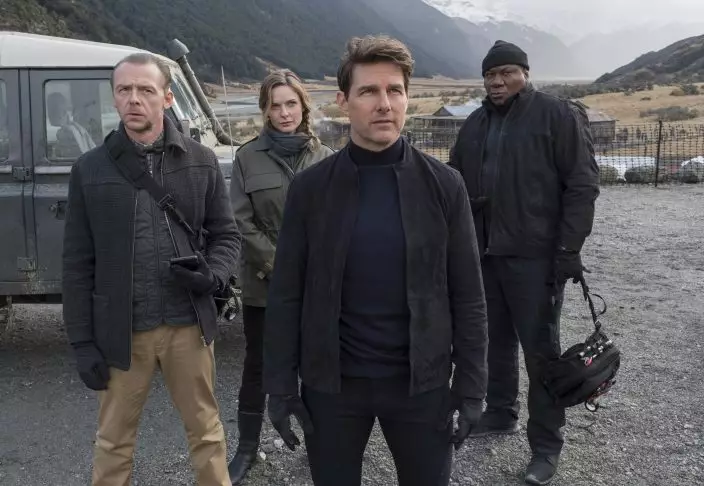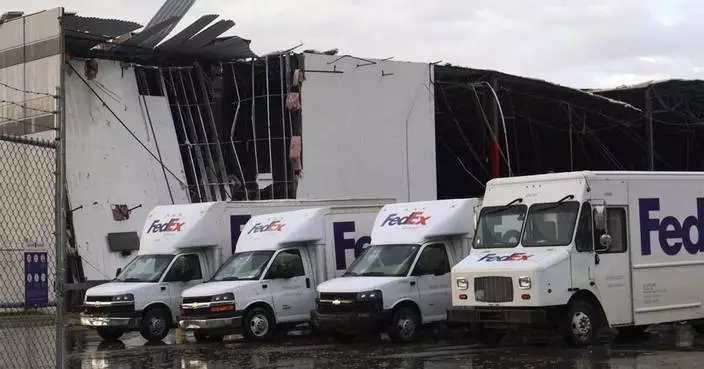Have you noticed something oddly tranquil about this summer movie season? For the first time in recent memory, there hasn't been one major bomb.
Usually by now, there would be blockbuster-sized craters left on the charred summer-movie battlefield, the inevitable toll of Hollywood's most high-stakes season. But this year, summer-movie bomb-watching, long one of the most dependable spectator sports of the season, has gone entirely without the sight of a "Lone Ranger"-sized mushroom cloud.
After the cataclysmic, the-sky-is-falling summer of 2017, when overall grosses slid 14.6 percent from the year before, Hollywood has rebounded. Ticket sales in North America this summer are up 11.3 percent, according to comScore. The comeback is even more pronounced when you factor in that the annual Marvel movie kickoff to summer slid just ahead of the official first weekend of May start, shifting the $678.5 million domestic for Disney's "Avenger: Infinity War" to the spring.

This image released by Paramount Pictures shows, from left, Simon Pegg, Rebecca Ferguson, Tom Cruise and Ving Rhames in a scene from "Mission: Impossible - Fallout." (David JamesParamount Pictures and Skydance via AP)
Amid a remarkably turbulent time for the movie business, this summer has been surprisingly, almost weirdly, steady.
"The studios did what they were supposed to," said Kyle Davies, domestic distribution chief for Paramount Pictures. "This notion that people are tired of going to the theaters, I don't believe it for a second. I think people are ready every weekend: 'Give me a reason to come.'"
Paramount didn't have a lot of releases over the summer but coming off the spring success of "A Quiet Place," Davies said, "Things have turned around." ''Mission: Impossible — Fallout," the sixth installment in the Tom Cruise franchise, is approaching $500 million worldwide, and the Diane Keaton-Jane Fonda-starring "Book Club" has, with $68.6 million, fared better than most comedies this year.

This image released by Focus Features shows Fred Rogers on the set of his show "Mr. Rogers Neighborhood" from the film, "Won't You Be My Neighbor." (Jim JudkisFocus Features via AP)
But even Tom Cruise, despite all his powers, can do only so much to tip the overall box office. So what's behind the bounce back?
MoviePass, the flailing subscription service, has claimed responsibility. Subscription moviegoing has surely had an additive effect, bringing more regular visitors to theaters. But how much? There's no statistical evidence of MoviePass boosting bottom lines, and studio executives downplay its influence as minimal. ("Mission: Impossible," for one, wasn't available on MoviePass.) MoviePass, which this week reduced its plan to three movies a month, says it accounts for 6 percent of all domestic tickets.
Mid-summer, AMC trotted out its own $20-a-month subscription option, attracting 260,000 subscribers in its first seven weeks. AMC on Thursday said that's translated to about 1 million admissions or about 4 percent of U.S. moviegoers at AMC theaters, the country's largest chain.
Jeff Bock, senior box-office analyst for Exhibitor Relations, said it's difficult to extrapolate how big a driver subscription services have been, though he credited the copious attention and drama around MoviePass with fueling moviegoing awareness. He's more inclined to point to the improved studio project, specifically sequels like "Incredibles 2," ''Ant-Man and the Wasp" and "Deadpool 2."
"The one thing that was very different from last year's sequels is that people wanted to see these. That's what it comes down to," said Bock. "You can say Hollywood's running on good credit and that's probably one of the reasons people are coming out weekend after weekend."
The difference in Pixar releases alone accounts for a yawning $440 million gap. Last summer, the little-loved "Cars 3" grossed $152.9 million domestically; this year, "Incredibles 2," the summer's biggest smash, has earned $590.3 million in North America.
The season hasn't been without its worrisome blips. Two of the most dependable forces in moviegoing — "Star Wars" and the Rock — both showed that they're mortal. But even those disappointments were measured. "Solo," while cause for real concern for "Star Wars" going forward, still nearly cleared $400 million worldwide. Dwayne Johnson's "Skyscraper," saved by sales in China, managed to gross almost $300 million worldwide.
But the final two weeks of August should only pad the season's lead. After scoring $5 million in its opening day Wednesday, Warner Bros.' "Crazy Rich Asians" — hailed as a watershed moment for Asian-American representation in mainstream moviemaking — appears poised to ride glowing reviews to approximately a five-day $25 million debut. Following last weekend's chart-topping "The Meg," a shark thriller, Warner Bros. will likely account for the summer's only two original, non-sequel no. 1 releases.
"It's content. When you look at last year, there wasn't much beside "Wonder Woman" and "Dunkirk" that really clicked," said Jeff Goldstein, Warner Bros.' distribution head. "When we've had dips, it's when the movies haven't delivered."
On the indie side, business has been slower, though A24 notched its highest grossing release with Ari Aster's acclaimed horror film "Hereditary" ($79.3 million worldwide). Spike Lee's recently released "BlacKkKlansman," for Focus Features, has added a jolt to the often sleepy August period, landing the director his best opening weekend in 12 years.
But the most unexpected sensations of the summer have been documentaries. There will be three docs to clear $10 million in box office, an unprecedented high for non-fiction filmmaking. "Won't You Be My Neighbor" is up to $21.8 million for Focus, Neon's "Three Identical Strangers" has hauled in $9.7 million, and Magnolia's Ruth Bader Ginsberg documentary "RBG" has grossed $13.7 million.
"It's a zeitgeist moment, no doubt," said David Linde, chief executive of Participant Media, which co-produced "RBG." ''People go to the theater for a unique experience and that experience is all about a collective experience. That hasn't ever been truer."
Follow AP Film Writer Jake Coyle on Twitter at: http://twitter.com/jakecoyleAP
WASHINGTON (AP) — The Biden administration paused a shipment of bombs to Israel last week over concerns that the country was approaching a decision on launching a full-scale assault on the southern Gaza city of Rafah against the wishes of the United States, Defense Secretary Lloyd Austin said Wednesday.
The shipment was supposed to consist of 1,800 2,000-pound (900-kilogram) bombs and 1,700 500-pound (225-kilogram) bombs, according to the official who spoke on the condition of anonymity to discuss the sensitive matter. The focus of U.S. concern was the larger explosives and how they could be used in a dense urban setting like Rafah where more than 1 million civilians are sheltering after evacuating other parts of Gaza amid Israel’s war on Hamas, which came after the militant group’s deadly attack on Israel on Oct. 7.
Austin confirmed the weapons delay, telling the Senate Appropriations subcommittee on defense that the U.S. paused “one shipment of high payload munitions.”
“We’re going to continue to do what’s necessary to ensure that Israel has the means to defend itself,” Austin said. “But that said, we are currently reviewing some near-term security assistance shipments in the context of unfolding events in Rafah.”
The U.S. has historically provided enormous amounts of military aid to Israel. That has only accelerated in the aftermath of Hamas’ Oct. 7 attack that killed some 1,200 in Israel and led to about 250 being taken captive by militants. The pausing of the aid shipment is the most striking manifestation of the growing daylight between Israel Prime Minister Benjamin Netanyahu’s government and the administration of Democratic President Joe Biden, which has called on Israel to do far more to protect the lives of innocent civilians in Gaza.
It also comes as the Biden administration is due to deliver a first-of-its-kind formal verdict this week on whether the airstrikes on Gaza and restrictions on delivery of aid have violated international and U.S. laws designed to spare civilians from the worst horrors of war. A decision against Israel would further add to pressure on Biden to curb the flow of weapons and money to Israel’s military.
Biden signed off on the pause in an order conveyed last week to the Pentagon, according to U.S. officials who were not authorized to comment on the matter. The White House National Security Council sought to keep the decision out of the public eye for several days until it had a better understanding of the scope of Israel’s intensified military operations in Rafah and until Biden could deliver a long-planned speech on Tuesday to mark Holocaust Remembrance Day.
Biden’s administration in April began reviewing future transfers of military assistance as Netanyahu’s government appeared to move closer toward an invasion of Rafah, despite months of opposition from the White House. The official said the decision to pause the shipment was made last week and no final decision had been made yet on whether to proceed with the shipment at a later date.
U.S. officials had declined for days to comment on the halted transfer, word of which came as Biden on Tuesday described U.S. support for Israel as “ironclad, even when we disagree.”
Press secretary Karine Jean-Pierre declined to square the arms holdup with Biden’s rhetoric in support of Israel, saying only, “Two things could be true.”
Israel’s ambassador to the United Nations, Gilad Erdan, in an interview with Israeli Channel 12 TV news, said the decision to pause the shipment was “a very disappointing decision, even frustrating." He suggested the move stemmed from political pressure on Biden from Congress, the U.S. campus protests and the upcoming election.
Biden has faced pressure from some on the left — and condemnation from the critics on the right who say Biden has moderated his support for an essential Mideast ally.
“If we stop weapons necessary to destroy the enemies of the state of Israel at a time of great peril, we will pay a price,” said Sen. Lindsey Graham, R-S.C., his voice rising in anger during an exchange with Austin. “This is obscene. It is absurd. Give Israel what they need to fight the war they can’t afford to lose.”
Independent Sen. Bernie Sanders of Vermont, a Biden ally, said in a statement the pause on big bombs must be a “first step.”
“Our leverage is clear,” Sanders said. “Over the years, the United States has provided tens of billions of dollars in military aid to Israel. We can no longer be complicit in Netanyahu’s horrific war against the Palestinian people.”
Austin, meanwhile, told lawmakers that "it’s about having the right kinds of weapons for the task at hand.”
"A small diameter bomb, which is a precision weapon, that’s very useful in a dense, built-up environment,” he said, “but maybe not so much a 2,000-pound bomb that could create a lot of collateral damage.” He said the U.S. wants to see Israel do “more precise” operations.
Israeli troops on Tuesday seized control of Gaza’s vital Rafah border crossing in what the White House described as a limited operation that stopped short of the full-on Israeli invasion of the city that Biden has repeatedly warned against on humanitarian grounds, most recently in a Monday call with Netanyahu.
Israel has ordered the evacuation of 100,000 Palestinians from the city. Israeli forces have also carried out what it describes as “targeted strikes” on the eastern part of Rafah and captured the Rafah crossing, a critical conduit for the flow of humanitarian aid along the Gaza-Egypt border.
Privately, concern has mounted inside the White House about what’s unfolding in Rafah, but publicly administration officials have stressed that they did not think the operations had defied Biden’s warnings against a widescale operation in the city.
The State Department is separately considering whether to approve the continued transfer of Joint Direct Attack Munition kits, which place precision guidance systems onto bombs, to Israel, but the review didn’t pertain to imminent shipments.
The U.S. dropped the 2,000-pound bomb sparingly in its long war against the Islamic State militant group. Israel, by contrast, has used the bomb frequently in the seven-month Gaza war. Experts say the use of the weapon, in part, has helped drive the enormous Palestinian casualty count that the Hamas-run health ministry puts at more than 34,000 dead, though it doesn’t distinguish between militants and civilians.
The U.S.-Israel relationship has been close through both Democratic and Republican administrations. But there have been other moments of deep tension since Israel's founding in which U.S. leaders have threatened to hold up aid in attempt to sway Israeli leadership.
President Dwight Eisenhower pressured Israel with the threat of sanctions into withdrawing from the Sinai in 1957 in the midst of the Suez Crisis. Ronald Reagan delayed the delivery of F16 fighter jets to Israel at a time of escalating violence in the Middle East. President George H.W. Bush held up $10 billion in loan guarantees to force the cessation of Israeli settlement activity in the occupied territories.
__
Associated Press writers Josef Federman in Jerusalem and Lolita C. Baldor and Matthew Lee contributed to this report.

White House press secretary Karine Jean-Pierre speaks during a briefing at the White House, Tuesday, May 7, 2024, in Washington. (AP Photo/Evan Vucci)

President Joe Biden speaks at the U.S. Holocaust Memorial Museum's Annual Days of Remembrance ceremony at the U.S. Capitol, Tuesday, May 7, 2024 in Washington. (AP Photo/Evan Vucci)

Pentagon chief confirms US has paused bomb shipment to Israel to signal concerns over Rafah invasion

Pentagon chief confirms US has paused bomb shipment to Israel to signal concerns over Rafah invasion

Smoke rises following an Israeli airstrike east of Rafah, Gaza Strip, Monday, May 6, 2024. (AP Photo/Ismael Abu Dayyah)
















